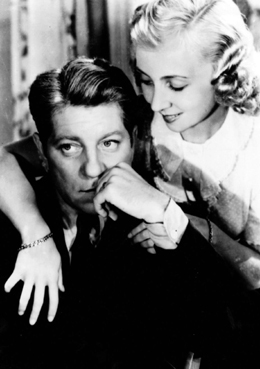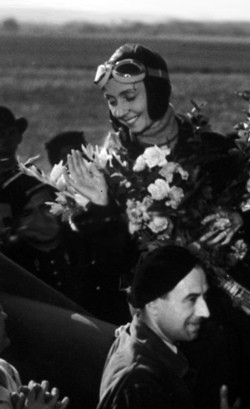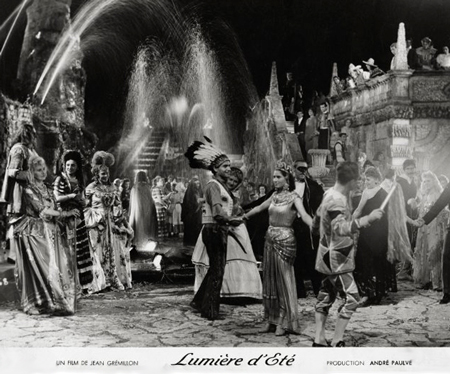
 |
|
|
|
The Criterion Collection caters to a wide spectrum of the film crowd, offering popular mainstream pictures, familiar world classics and contemporary works by less familiar names. But Criterion's spin-off line Eclipse regularly takes us into completely new classic movie territory. The company has provided American film fans with its only contact with French names like Sascha Guitry and Raymond Bernard, and now they add another. The series Jean Grémillon During the Occupation groups three pictures by a prolific French director who continued to work during WW2, for companies supervised by German occupiers. The films are quality goods by any measure. All three were filmed on location with name stars. More importantly, Jean Grémillon applies close attention to character detail and dramatic nuance. I liked the first picture quite a bit and was surprised to find the second even more interesting. A synopsis of the third show leads one to expect a standard aviation film, but it turned out to have an even stronger emotional grip than the other two. 
1941's Remorques (Stormy Waters) is an intense character study centering on the skipper of a seagoing salvage tug that rescues ships in distress. Captain Laurent (Jean Gabin) and his crew spend a lot of time waiting but must be ready to ship out at a moment's notice, as the first tug on the scene wins the salvage rights. Laurent's wife Yvonne (Madeleine Renaud) fears that he may never come back from one of these perilous assignments. One trip finds Laurent dealing with the dishonest captain of a stricken ship, who would rather drown his men than lose money. At the last minute, he cuts his own towline and restarts an engine to reach port, stealing Laurent's salvage prize. Laurent meets Catherine (Michèle Morgan), the wife of the dishonest captain. She impresses Laurent and they begin an affair. Laurent knows he's hurting Yvonne but doesn't realize that he's literally killing her -- she has kept from him the secret of her bad heart. Its much-touted special effects of ships in a storm at sea now look very dated, but Remorques is an compelling drama both at sea and on land. The respected Laurent alternately rewards and punishes his men, instilling in them a sense of duty and responsibility to each other; he contrasts strongly with the despicable captain who would rather founder than see his boat be claimed as salvage. But Laurent himself folds, under pressure from his employers. He wants to quit but they threaten to sell the tug and throw everyone out of work. Madeleine Reynaud is in all three of these Grémillon pictures and was his favorite actress. Here she's the selfless good wife and romantic martyr. Jean Gabin and Michéle Morgan gave their all to this show and then apparently slipped quietly out of occupied France -- only a few months later, each was starring in a Hollywood movie. Interestingly, some actors and directors that remained in France faced an interruption in their careers after the Germans were driven out. Politics and jealousy may have been factors when some were put on 'cultural trial'. But Morgan and Gabin were both welcomed back. Mich´le Morgan established an international reputation while Jean Gabin, not happy working in Hollywood, hightailed it back to the security of his Parisian home town. The credits for Remorques include some of the top writing talent working during the occupation: Jacques Prévert, André Cayette, Charles Spaak. Although the subject matter isn't quite gloomy enough to be classified as French Poetic Realism, the atmospheric foggy nights certainly remind us of movies like Le Quai de brumes. 
Made in 1943, Lumière d'éte is an almost surreal melodrama of the kind we wouldn't think would win a green light from the German occupiers. Its surface is realistic enough but the characters are tangled in a strange story of social privilege and class conflict. The exteriors were filmed in a mountainous but treeless region in the South of France; it's hard to believe that such a picture could be made during conditions of wartime deprivation. The fussy Cricri (Madeleine Renaud) runs a lonely hotel atop a mountain near a new dam construction project, and also near the castle of her aristocratic ex-lover Patrice (Paul Bernard). Cricri's anxiety level rises with the arrival of the younger and more attractive Michèle (Madeleine Robinson), a footloose Parisian awaiting her lover Roland (Pierre Brasseur), an irresponsible, pompous but somewhat lovable artist. Not only does Patrice take notice, so does the handsome Julien (Georges Marchal), a working class engineer at the dam. Patrice hires Roland to relocate to the castle to decorate a room, a ploy to allow the wealthy Patrice to get his hands on Michéle. The girl assures Cricri that she has nothing to do with Patrice, but her host talks her into staying for a gala costume ball. Unfortunately, Patrice is dependent on getting everything he wants and is willing to use his shooting skill to remove obstacles between himself and Miche´le -- like the protective Julien. Cricri sees the pattern, as Patrice was involved in similar 'accidental' shooting back in Paris, years ago. Lumière d'éte is a bizarre mixture of barren landscapes, urgent passions and class conflict. Julien assumes the right to take what he wants, while the jovial Roland will go wherever he can find a patron to cover the financial holes he digs for himself. Michéle hasn't sorted out the fact that people will say one thing and do another. She confuses Julien for Roland in a spicy midnight meet-cute scene in her hotel room. Meanwhile, the noble Patrice lives in a bubble of privilege while the future of France is being constructed a few miles down the road; people travel by car, motorbike, horse carriage and a sky bucket used to haul concrete to the site. The costume ball provides an exotic ritual, where people can hide behind masks to show their true character. Roland becomes dangerously drunk, while Cricri fires abuse at the younger girl who appears to be stealing her beau. The unwelcome Julien waits outside, sensing that Michéle is in danger. The show ends in a drunken car ride on the mountain roads and a violent series of events at the construction site, tracing a progression from the glass hotel (the present) to the decadent castle (the past) to the dynamic future (the dam). Eclipse liner note scribe Michael Koresky tells us that Lumière d'éte was soon withdrawn by the Nazi-controlled censors, who presumably were uncomfortable seeing a powerful and authoritative local noble portrayed as a murderous madman. 
The description of Jean Grémillon's 1944 Le ciel est à vous (The Woman Who Dared) makes it sound like a routine inspirational story about a French Amelia Earhart. It turns out to be an unusual and unusually intense domestic drama about the nature of marriage and what couples owe one another. Inspired by the story of an admired French aviatrix, Grémillon expresses the romantic urge to fly that some noted directors (Billy Wilder, for one) fumbled. This time Madeleine Renaud plays a fiercely independent woman who one day takes a plane ride. From then on knows what she must do. The Gauthiers are forced to move their auto repair shop into town to make room for a new aerodrome. Clever mechanic Pierre Gauthier (Charles Vanel) flew for the Escadrille in WW1 and is soon hobnobbing with Dr. Maulette, the respected local who helped found the aerodrome and is starting an aero club. The Gauthier's finances are unstable, but Pierre sees his way to buying his talented daughter an expensive piano. A businessman is impressed by the skilled and dedicated Pierre. Het cannot woo Pierre to the big city to supervise his large repair garage, but Pierre's wife Théreèse takes over the man's auto showroom and does extremely well. When Théreèse returns home when she finds the kids unsupervised, the shop in a slump and Pierre out at the aerodrome, giving rides in a small plane he has bought. Théreèse is determined to put a stop to the foolishness until Dr. Maulette gives her a ride in his plane. She returns to the ground a changed woman. The Gauthier's drop everything, seriously neglecting their children to pursue their dreams of breaking a flying record. Théreèse wants to go after a woman's distance record held by the popular aviatrix Lucienne Ivry (Anne Vandène). They fall badly into debt, even selling the daughter's piano and forbidding her to pursue a career in performing. Come the day of the flight the Gauthiers see that Mme Ivry has a new airplane that far outclasses theirs. They resign themselves to quit but at the last moment Théreèse takes a chance, flying off in a plane that doesn't even have a radio. Hours later and way overdue, she's feared lost over the Mediterranean. Pierre must face how their mania has destroyed his family. Le ciel est à vous has no extended flying scenes; when Théreèse flies south on her long distance run we stay firmly rooted back home with Pierre. Yet the film expresses the full mystique of flying. When we see Théreèse's transfigured smile we know she's hooked; from then on the task of building a new plane is a perfect expression of her relationship with her husband, a master airplane mechanic. Madeleine Renaud is inspiring, but the surprise for viewers will be seeing the emotional, heartwarming performance of Charles Vanel, best known today for his turn as a brutal S.O.B. in Georges Clouzot's pessimistic The Wages of Fear. Grémillon and his writers Charles Spaak and Albert Valentin don't whitewash the effects of the Gauthiers' flying obsession. Pursuing their dream means that their adorable daughter must be denied her own. Both Pierre and Théreèse are quite cruel about selling her piano and forbidding her to play. The daughter's piano teacher tries to make them understand, and is told to mind his own business. Harping constantly from the sidelines is Théreèse's mother, who becomes a grave threat when her daughter's plane disappears. Already wracked with guilt, Pierre is bombarded both with Mother's accusations of irresponsibility and anonymous abusive phone calls from his neighbors. He's finally cornered by a small-minded mob incensed that a man would send his wife off on an obvious death flight; Pierre is unable to protest that Théreèse was the one to make the decision and that she left happy and fulfilled. 
The occupation censors slammed Lumière d'éte but left Le ciel est à vous untouched, despite its picture of small town violence worthy of Clouzot's Le Corbeau. The movie was reportedly the director's biggest success. Eclipse's DVD series Jean Grémillon During the Occupation presents the three features on separate discs. The transfers are quite good, although not given the digital scrubbing we're accustomed to on the more expensive Criterion Collection releases. All three pictures are fully intact, visually rich and free of audio distortion. For this viewer they are a welcome discovery. The only extra is the excellent liner notes of Michael Koresky, that give just enough background on Jean Grémillon to help us appreciate the director's fine work. It must be the combination of the world-class screenwriting and Grémillon's fine direction, but these three features make a more positive impression than many European shows designated as classics. The set is highly recommended.
On a scale of Excellent, Good, Fair, and Poor,
Jean Grémillon During the Occupation Blu-ray rates:
Reviews on the Savant main site have additional credits information and are often updated and annotated with reader input and graphics. Also, don't forget the 2011 Savant Wish List. T'was Ever Thus.
Review Staff | About DVD Talk | Newsletter Subscribe | Join DVD Talk Forum |
| ||||||||||||||||||